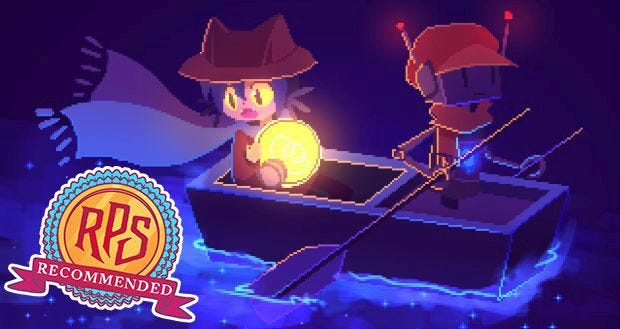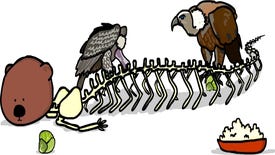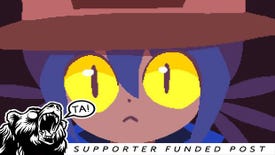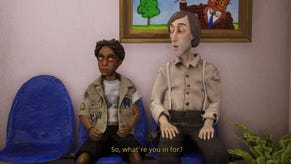Wot I Think: OneShot
Shiny
I've never played a game like OneShot [official site]. I've played rather a lot of games, too. It's also been a really long time since I've cared about a game's main character quite so much, to the point where decisions really mattered to me. Which is rather a lot to say of a game made in RPGMaker. But then this is a game that does stuff with that cutesy engine that I would never have thought possible. It does stuff with my PC that I didn't know games could do. This is quite the thing. Here's wot I think:
Things start off with few hints of what's to come. You play as a young girl with cat-like eyes who wakes to find herself in a sparse, locked room. There's a shelf, a PC, a window and a TV remote. Getting out from there perhaps evokes locked room games so popular on mobile, but this isn't a theme that lasts. Instead she finds herself in a desolate wasteland of broken robots, fragmented lands, and eternal darkness.
But, you almost immediately learn, she is the chosen one! She is the "Messiah", clutching - as she is for most of the game - a light bulb the few remaining locals refer to as "the sun". The Messiah is prophesied (so you are told by a specially powered ProphetBot) to carry the sun to the top of the tower in the central city of this world, and return light to the land. Okay, fairly standard RPG stuff, if still bleak and peculiar.
It gets a little stranger when three other protagonists are introduced, one of them being, well, you. I was wandering the Messiah through the outer province of The Barrens, a little stuck for what to do and pretty sure I needed to find the combination for a safe I'd discovered elsewhere, and found a computer inside an abandoned building. Using it, it becomes clear the machine is talking to me, not the game's character, which she picks up on as well. It comments that the safe combination is not available in this world. And then the game popped out of fullscreen (it runs at 640x480, but F8 has it take up your whole screen) and back into a little window, and a Windows dialogue box popped up. "Do you know what that means, John?"
I'd never told the game my name. That was spooky. It turns out it digs it from your Windows profile (and were you to have that set to something else, it does offer a chance to change it in-game), and that's not the only time it messes about with your PC. I did know what it meant. I found the combination outside of the game, and from this point on the Messiah knew I was there too.
At which point a relationship between you and the character you're controlling begins. Through limited dialogue options you can answer her questions, choose how much of your own reality you might want to reveal to her, as the two of you discuss the nature of the Sun. You can also choose how much you want to play up to her assumption that you're some sort of god.
The plot that unfolds is simple, but superb, even before the meta peculiarities. Very early on it becomes apparent that this is a world that's in real trouble, strange glitches appearing alongside the more immediately obvious consequences of losing daylight. And there's history here, a complex background of humanoid races and the robots they've created, how this small society is adapting to a world where bioluminescence is their only light source, and their shared history seemingly entirely collated by a figure referred to as The Author.
Then the Messiah sees a bed, and asks you - you - if you mind if she has a sleep. Say yes and she'll climb into bed, the screen fades, and then the game closes. You're back to desktop. Reload it and she's in the middle of a dream. Absolutely amazing. But, it turns out, just a small taste of the cleverness it has in store. I'm not going to spoil any of those surprises, but I'm pretty sure you'll never have had a game do what it does.
(A word of warning in that respect, and perhaps a hint of a spoiler - if you’re using any software that replaces Windows' defaults for desktop gubbins, you’re going to hit a problem at a certain point. I closed down DisplayFusion, and had a much better time with the game as a result.)
What makes the game truly magical would all take away from your experience of playing it. I want to say, "Gosh, X meant X was X!" and think such uncensored sentences would have you forking out the £6.30 without another thought. But then you'd hate me when you got to that for taking away that moment of surprise. So instead I'll talk themes. This is a game about relationships, both the immediate connection between you and the character you're playing, as well as an opaque commentary on the nature of all relationships between players and gaming characters. It made me think about such things in a new way, without ever overtly flagging that I should, and certainly without ever being so clumsy or cumbersome as to outright raise the matter in its narrative. It's also a game about childhood, without feeling the need to shout about that - it just is about childhood because the character is a child, and the writing is true to that.
It's also ridiculously lovely. The interactions with other characters are mostly brief, but the many dozens of them are all worth reading, and nearly always contain a moment that will make you smile. And why is it called OneShot? I seriously don't want to say. You'll appreciate why.
This is an incredible game. I started it with no expectations at all (as I mentioned before, I can't even remember why I'd flagged the game to look at), and have come away from it as one of my favourite games of 2016. It rather nicely book-ends the year for me with Pony Island, two utterly different games that both explore similar themes from extremely different angles. Completely charming, delightfully written, and extremely clever - stick this on your Christmas playlist.
OneShot is out now on Steam for £6.30/$9/€9.


















